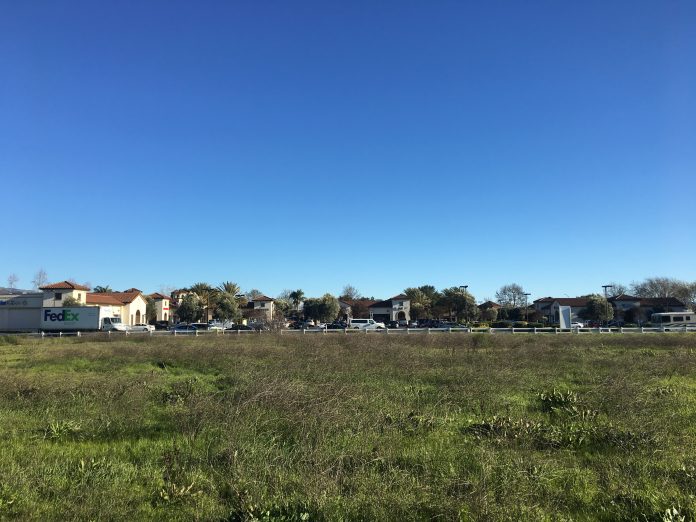
Tensions continued to mount in the week after a petition started circulating around Morgan Hill that would reverse the city council’s Feb. 6 decision to allow two hotels to be built in Madrone business park.
The petition, started by hotel owners, has been disseminated outside of local Morgan Hill businesses by professional signature gatherers. The city sent an urgent email the night of Feb. 11 to residents, alerting them to the petition.
In response, the developer of the two new proposed hotels enlisted its own paid representatives to distribute competing information in support of the project, often in the same locations where the petitioners were gathering signatures.
The council first approved a zoning amendment for the properties at a Jan. 23 council meeting with a 5-0 vote. After the second reading of the ordinance on Feb. 6, a petition to challenge the council’s decision to allow two four-story hotels—a Marriott and a Hilton—to be built in the business park began to gain signatures.
Madrone Village is the shopping center/business park off of Cochrane Road and Madrone Parkway. It had originally been zoned for a larger commercial space, such as a grocery store, but the council decision added a hotel use to the zoning.
Existing hotels consistently opposed the zoning amendment at all stages of approval. The hoteliers said the new hotels would create a surplus of rooms, flooding the market. They also believe the developer, Toeniskoetter Development, was able to sell the land to the hotels at a below market rate of $14.75 per square foot.
Brad Krouskup, president and CEO of Toeniskoetter Development, said the lower cost of land was approved because of the type of hotels that are being built. Krouskup told the Times the hotels will be more expensive to build because they will be more advanced designs. He said the new hotels will be “the two nicest hotels in Morgan Hill.”
For the city council, the decision was about bringing business to Morgan Hill. A study was conducted by HA&A in 2015 that identified mid and upscale hotels as a need for the city. That study along with the financial market are what the council cited as reasons for the projects.
Morgan Hill has also put a focus in recent years on increasing tourism to the city.
Voters in the November election approved a 1 percent increase to the city’s transient occupancy tax to 11 percent, which was originally estimated to bring an additional $270,000 in revenue to Morgan Hill each year.
With the TOT increase came approval by the council for the formation of a tourism business inclusion district.
The Feb. 11 email warned that if the petition was successful it “would cause the city to lose approximately $800,000 annually in projected general fund revenues from transient occupancy taxes (TOT), which provide funding for police, fire, parks and road maintenance,” wrote Maureen Tobin, Communication and Engagement Officer for Morgan Hill. “A special election, if necessary, would also impact the city’s general fund at a cost from $200,000 (to) $400,000.”
Tobin told the Times in a follow-up email that the city arrived at the projected TOT profits “based on annual revenue collected from hotels of similar size in Morgan Hill. Expansion of this market was identified in a hotel market study conducted by Hotel Appraisers and Associates.”
Asit Panwala, whose parents own the Comfort Inn in Morgan Hill, has been leading the fight against the two new hotels. He believes the addition of new hotels would not raise the city’s TOT revenues because the amount of visitors would stay the same, just distributed to more hotels.
Krouskup sees the hoteliers complaints as a fear of competition. He said his company has been circulating flyers stating its position along with the city’s Feb. 11 email. The city clerk’s information needed to remove a signature from the petition, was also added.
While the city said nothing was incorrect on the statements featured on the petition, Tobin said the paid signature gatherers had been verbally relaying misinformation to potential signers. Tobin told the Times that the city sent the email in an effort to clarify for residents who had been calling the city with misinformation and asking questions.
Panwala believed the city was fearful of allowing residents to vote on the matter. “They’re afraid of people deciding for themselves what Morgan Hill needs.”
The fight against the new hotels is not the first of its kind in Morgan Hill. The California Supreme Court settled a decision in August 2018, ruling that residents of Morgan Hill had the right to vote on a zone change that would have allowed for a hotel on a 3.39-acre site near the corner of Madrone Parkway and Lightpost Way.
The current controversy differs because the city did not change the zoning of the Madrone parcels—they added another use to the existing commercial zone. However, the precedent exists for the court to uphold the petition and allow for a referendum.
For a referendum to block the council’s decision, the petition must get valid 2,390 signatures, or 10 percent of Morgan Hill’s registered voting population, and be submitted by March 8. From that date the Santa Clara County Registrar of Voters would have 30 days to certify the petition and its signatures.
If the petition is certified, the council can decide to repeal the ordinance or put it to the residents of Morgan Hill for a vote.







